
Juscelino Kubitschek de Oliveira, also known by his initials JK, was a prominent Brazilian politician who served as the 21st president of Brazil from 1956 to 1961. Kubitschek's government plan, dubbed "50 years in 5", was centered on economic and social development. During his term the country experienced a period of notable economic growth and relative political stability. However, there was also a significant increase in external debt, inflation, income concentration and wage erosion. At the time, there was no re-election and, on 31 January 1961, he was succeeded by Jânio Quadros, supported by the UDN. Kubitschek is best known for the construction of Brazil's new capital: Brasília, which was inaugurated on 21 April 1960, replacing Rio de Janeiro.

Carlos Frederico Werneck de Lacerda was a Brazilian journalist and politician.

Nilo Procópio Peçanha was a Brazilian politician who served as seventh president of Brazil. He was governor of Rio de Janeiro (1903–1906), then elected the fifth vice president of Brazil in 1906. He assumed the presidency in 1909 following the death of President Afonso Pena and served until 1910.
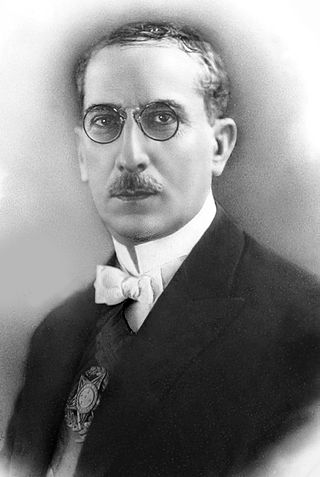
Artur da Silva Bernardes was a Brazilian lawyer and politician who served the 12th president of Brazil from 1922 to 1926. Bernades' presidency was marked by the crisis of the First Brazilian Republic and the almost uninterrupted duration of a state of emergency. During his long political career, from 1905 until his death, he was the main leader of the Republican Party of Minas Gerais (PRM) from 1918–1922 until the party's closure in 1937, and founder and leader of the Republican Party (PR).
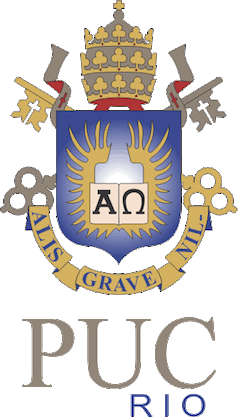
The Pontifical Catholic University of Rio de Janeiro is a Jesuit, Catholic, pontifical university in Rio de Janeiro, Brazil. It is the joint responsibility of the Catholic Archdiocese of São Sebastião do Rio de Janeiro and the Society of Jesus.

The Paulista Republican Party was a Brazilian political party founded on April 18, 1873 during the Itu Convention and sparked the first modern republican movement in Brazil.

Nelson Azevedo Jobim is a Brazilian jurist, politician and businessman. He held the positions as congressman, Minister of Justice, Minister of Defense, Minister of the Supreme Federal Court (STF), where he was also president from 2004 to 2006. He is a member of the board of directors and responsible for institutional relations and compliance policies at BTG Pactual Bank.

Marcelo Bezerra Crivella is a Brazilian Evangelical pastor, gospel singer and politician. He served as the mayor of the city of Rio de Janeiro from 1 January 2017 until 31 December 2020. In the 2020 election, Crivella ran for a second term but lost to Eduardo Paes in each of the city's 49 constituencies.

Rodrigo Augusto da Silva, nicknamed "the diplomat", was a politician, diplomat, lawyer, monarchist and journalist of the Empire of Brazil. He is best known as the minister that authored and countersigned with Princess Isabel, then Princess Imperial Regent the law that ended slavery in Brazil. Rodrigo was born in São Paulo into a family of wealthy financiers. His father, the Baron of Tietê, was also a politician and leader of the conservative party in São Paulo.
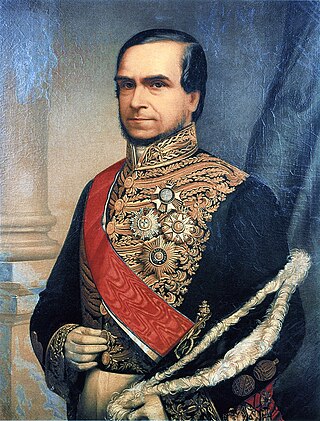
Honório Hermeto Carneiro Leão, Marquis of Paraná was a Brazilian politician, diplomat, judge and monarchist. Paraná was born to a noble family in São Carlos do Jacuí, in what was then the captaincy of Minas Gerais. After attending the University of Coimbra in Portugal and having returned to Brazil, Paraná was appointed a judge in 1826 and later elevated to appellate court justice. In 1830, he was elected to represent Minas Gerais in the Chamber of Deputies; he was re-elected in 1834 and 1838, and held the post until 1841.

The Brazilian Labour Party was a political party in Brazil registered in 1981 by Ivete Vargas, niece of President Getúlio Vargas. It claimed the legacy of the historical PTB, although many historians reject this because the early version of PTB was a center-left party with wide support in the working class. It was the seventh largest political party in Brazil with more than a million affiliated as of 2022.

Epitácio Lindolfo da Silva Pessoa was a Brazilian politician and jurist who served as 11th president of Brazil between 1919 and 1922, when Rodrigues Alves was unable to take office due to illness, after being elected in 1918. His period of government was marked by military revolts that would culminate in the Revolution of 1930, which brought Getúlio Vargas into control of the federal government.
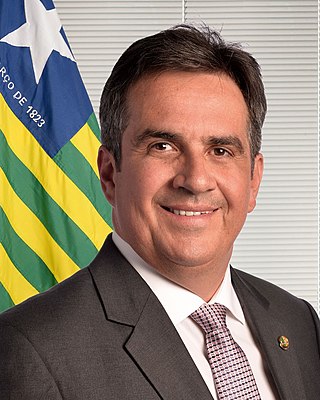
Ciro Nogueira Lima Filho is a Brazilian lawyer, businessman, politician, and a member of the Progressistas (PP) party, of which he is the current president. He has represented Piauí in the Federal Senate since 2011. Previously, he was a Federal Deputy representing Piauí from 1995 to 2011. He is a member of Progressistas.
Antonio Luz Furtado is a Brazilian computer scientist and Professor of Computer Science known for his work in databases and conceptual modeling.
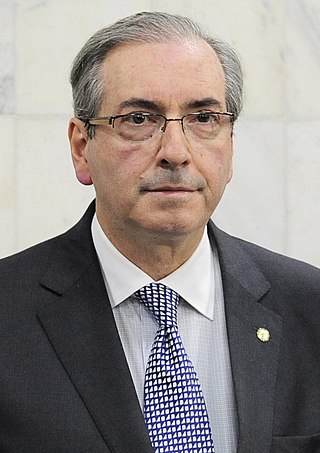
Eduardo Cosentino da Cunha, is a Brazilian politician and radio host, born in Rio de Janeiro. He was President of the Chamber of Deputies of Brazil from February 2015 until 5 May 2016, when he was removed from the position by the Supreme Court. BBC News labeled him the "nemesis" of Brazilian President Dilma Rousseff.

The 2020 Rio de Janeiro municipal election took place in the city of Rio de Janeiro, Brazil in November 2020 to elect a mayor, a vice mayor, and 51 city councillors for the administration of the city. On the 29 November 2020 run-off election, former mayor Eduardo Paes, of the Democrats (DEM), defeated incumbent mayor Marcelo Crivella of the Republicans (REP), who lost his bid for re-election.
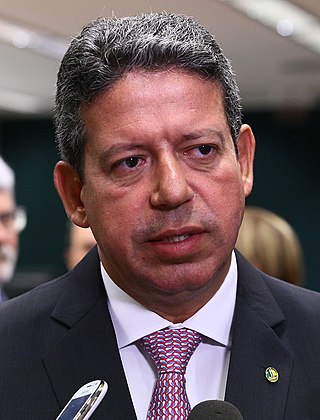
The 2021 President of the Chamber of Deputies of Brazil election took place on 1 February 2021, the day after the opening day of the 3rd Session of the 56th Legislature of the National Congress.
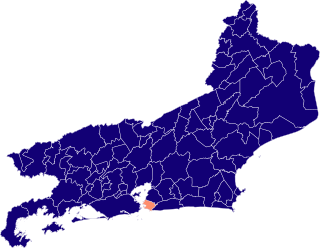
The 2022 Rio de Janeiro state election took place in the state of Rio de Janeiro, Brazil on 2 October 2022. Voters elected a governor, vice governor, one senator, two alternate senator, 46 representatives for the Chamber of Deputies, and 70 Legislative Assembly members, with a possible second round to be held on 30 October, 2022. Under the Constitution of Brazil, the governor will be elected for a four-year term starting 1 January 2023. and with the approval of Constitutional Amendment No. 111, it will end on 6 January, 2027.

The Tiradentes Palace is an eclectic government building located in the Centro neighborhood (bairro), next to the Paço Imperial in Rio de Janeiro, Brazil. It was inaugurated on 6 May 1926 and was the former seat of the Chamber of Deputies of Brazil, between 1926 and 1960, and is the current seat of the Legislative Assembly of the State of Rio de Janeiro.


















